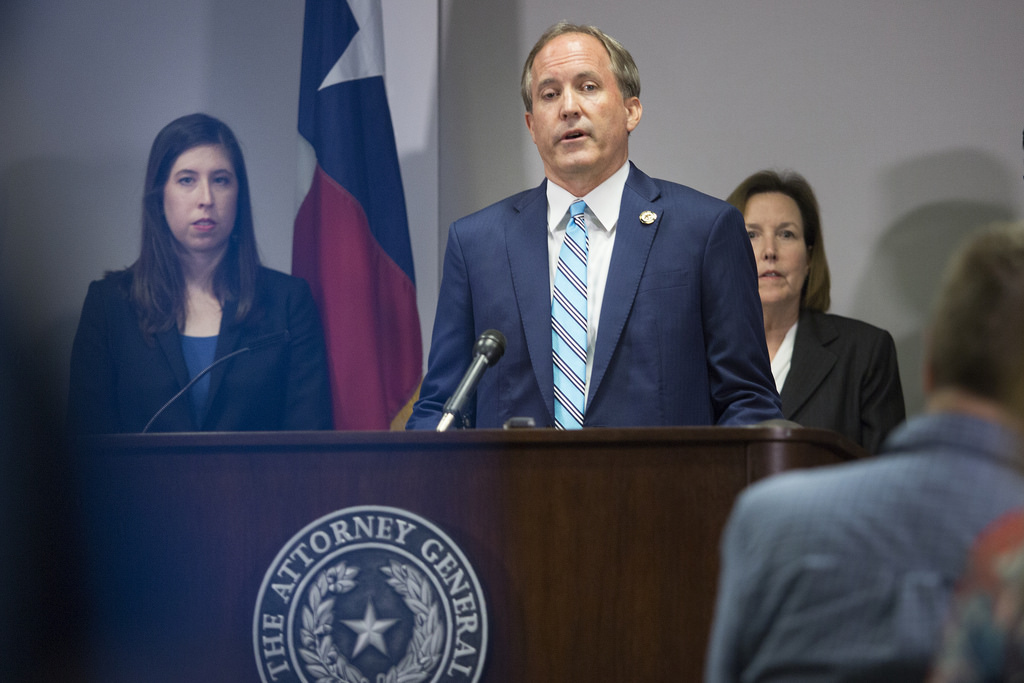Oral arguments for Texas v. United States begin Wednesday in a federal courtroom in Fort Worth. Texas Attorney General Ken Paxton, along with attorneys general from 19 other Republican-led states, is hoping to do in court what GOP lawmakers have not been able to do in Congress: get rid of the Affordable Care Act. Paxton’s central argument is that when, in 2017,the Republican-led U.S. Congress got rid of the tax penalty levied on those who don’t have health insurance, the entire law was rendered unconstitutional.
The Trump administration has refused to defend the law in court, so California’s attorney general, along with those from other Democratic-led states, are stepping in to defend the ACA in the case.
With the U.S. Justice Department. ostensibly on Paxton’s side, it may seem that he will have an easy chance of winning the case. But University of Michigan law professor Nicholas Bagley says that’s not a foregone conclusion.
Bagley says Paxton likely filed the lawsuit in Fort Worth in hopes that it would appeal to conservative judges there. Judge Reed O’Connor of the Federal District Court for the Northern District of Texas is presiding over the case. Texas has asked him to place a preliminary injunction on the ACA, but Bagley says the even if O’Connor grants that, the outcome wouldn’t necessarily bend in Texas’ favor.
“I think the likelihood of an injunction taking effect immediately is quite low,” Bagley says. “Even if the judge thinks an injunction is appropriate, the judge is likely to stay that decision…to allow the Blue states to take an appeal.”
Bagley says the judge would likely do so because abruptly halting the health care law could have a powerful effect on insurance markets nationwide. Bagley says it’s more likely that the case will work its way up to the Supreme Court before an injunction would take effect.
Texas v. U.S. echoes a similar lawsuit against Deferred Action for Childhood Arrivals, or DACA. In that case, a judge ruled the policy unconstitutional, but also decided that abruptly ending it would cause many people undue hardship. In cases with potentially far-reaching effects, Bagley says a judge will weigh the “balance of harm” to those affected by the ruling.
In the case of the ACA, he says a judge might think to themselves, “Okay, maybe I’m sympathetic to the constitutional claim but there’s no fire, there’s no urgency, nobody is dying as a result of having health insurance – quite the contrary.”
Bagley says a judge could let the case proceed at a slower pace by either declining to enter a preliminary injunction, or by entering a preliminary injunction but putting it on hold.
However it shakes out, Bagley says Texas v. U.S. is a big deal.
“This litigation is much closer to an effort to undo the Affordable Care Act in court than anything else,” he says.
This lawsuit represents a Republican effort to get rid of the ACA through the judicial system, since conservative lawmakers have failed to do so through legislation. But Bagley says the legal arguments in the case are weak.
“They’re just god-awful to the point of frivolousness,” Bagley says. “The likelihood that the courts will endorse the kind of theory they are putting forward is extremely low.”
But Texas does have a conservative, and potentially sympathetic, judge hearing the case. Bagley says while Judge O’Connor might be open to entertaining Texas’ arguments, its chances are “slim to none” in the Supreme Court, even with the potential addition of Brett Kavanaugh to the bench.
Written by Caroline Covington.















